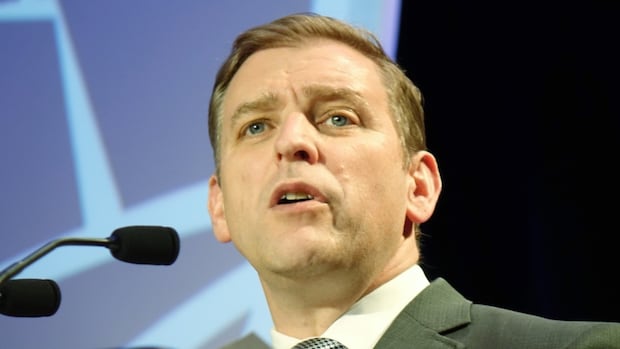
N.L. has priorities for how it will use its Churchill Falls billions. Debt reduction is one of them
CBC
As billions of dollars could flow into Newfoundland and Labrador's coffers through a dramatically revamped Churchill Falls hydroelectrical deal, Premier Andrew Furey says some of them could be targetted against a massive debt that has mushroomed over the years.
Furey and Quebec Premier François Legault last week signed a memorandum of understanding that, if sanctioned, will replace a 65-year contract on Churchill Falls, while also proceeding with the undeveloped Gull Island megaproject.
According to the MOU signed Thursday, the proposed deal would bring in $17 billion over the next 17 years.
That happens to be close to Newfoundland and Labrador's net debt, which the province pegged at $17.7 billion for the 2023-24 fiscal year.
Even the smallest payment of $1 billion each year could have a dramatic impact in N.L., where the most recent provincial budget was $10.4 billion.
In the last two years, N.L. spent about $1 billion each year just to service its net debt, which has grown steadily in the last 15 years. In the 2010-11 fiscal year, for instance, the province's net debt was estimated at $8.2 billion.
Furey said he has his eye on several ways to use the initial annual payments of $1 billion, and debt reduction is one of them.
So too are payments to a "future fund" as well as to things like infrastructure and services.
"We would look at dividing this up — this surplus up — to pay down debt, save for the future and invest in today. That would be a reasonable, prudent, balanced approach," Furey told CBC's Power and Politics last week.
"We would ensure that we are paying down debt. And coincidentally by the way, the debt is $17 billion. We'll be paying down debt while saving for the future."
Through the future fund, which was formed a few years ago to prepare for a time when oil revenue has dried up and which now has $300 million, future generations in Newfoundland and Labrador could pay for services from its proceeds, he said.
That is, "if we're smart, we continue to invest in it and we don't touch it," Furey said.
Furey said the new Churchill Falls agreement will have a positive impact for years to come and listed how the new revenue could be spent on infrastructure.
"It will mean nearly a quarter of a trillion dollars in revenue over the life of the agreement for schools, hospitals, roads and debt relief," he said on Thursday.





















 Run 3 Space | Play Space Running Game
Run 3 Space | Play Space Running Game Traffic Jam 3D | Online Racing Game
Traffic Jam 3D | Online Racing Game Duck Hunt | Play Old Classic Game
Duck Hunt | Play Old Classic Game











